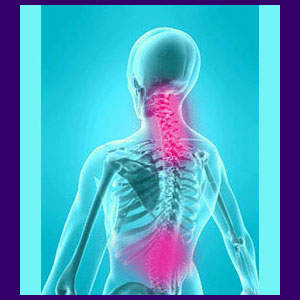
Back pain substitute symptoms are other psychosomatic conditions that are either experienced in tandem with back ache or as a replacement for back ache. It is common for patients displaying a tendency for developing psychological pain syndromes to have a history of one or more additional psychosomatic conditions. The severity of the symptoms will often be dependent upon the sensitivity of the causative emotions.
A great number of patients who are cured of back pain temporarily or permanently through the power of the placebo effect will immediately or eventually demonstrate the beginning of a new chronic condition as a result of the substitute symptoms process. Without addressing the underlying causative mechanism which is driving the symptom imperative, the substitute symptoms will likely endure and even escalate with each new expression.
This essay details the occurrence of substitute symptoms in many back pain patients.
Back Pain Substitute Symptoms Theory
No one is sure why some people develop back pain and others might develop different psychologically-induced pain syndromes. There is evidence that severe pain is most often experienced by patients who have very significant emotional and psychological issues to repress.
It is also evident that psychological pain is very adaptive and will often change and modify its symptoms in order to maximize its distractive effects on the patient. Back pain patients with severe symptoms often have a history of a variety of psychosomatic conditions of varying intensities prior to developing their primary pain syndrome. I can attest to this in my own case, with back ache starting after many years spent suffering with stomach issues, followed by chronic wrist pain which eventually resolved as mysteriously as it began.
Substitute Symptom Conditions
Any psychosomatic pain syndrome can substitute for any other, at any time. Patients will often try a new treatment that has an actual positive or placebo positive effect on their pain. The symptoms might get better, but the underlying psychological cause remains. Therefore, the patient is likely to develop another variety of psychosomatic pain. This new pain might be identical to the old, but in a new location, or might be a completely different manifestation of psychogenic symptoms.
This is one of the main reasons why patients with psychosomatic pain remain in the healthcare system for extended periods of time. As one condition is identified and corrected, another pops up. Neither the doctors or the patient have any idea that the true source of symptoms is a psychological causation.
Drugs, exercise or surgery will do nothing to correct a psychological or emotional process creating health problems. The only way to truly end the symptom substitution is to identify the psychological source and acknowledge it.
Back Pain Substitute Symptoms Factsheet
I experienced a variety of substitute symptoms both prior to my development of back pain and during my decades of suffering under it. Before I had my first attack of back ache at 16, I had a history of tendonitis, digestive tract sensitivity, allergies and headaches. Unbeknownst to me or my doctors, these were the early incarnations of psychosomatic pain.
None of these precursor pain syndromes were successful at fully distracting my conscious mind away from the painful emotional issues hidden in my subconscious. Back pain was the answer to that problem. Once my psychological back pain started, my life began to revolve around the suffering. It was the most successful of all the symptomatic syndromes and proved to be the longest lasting and hardest to cure.
Even during my time with back pain, there were times when my back felt better, but my stomach would act up. It was as if the psychological process was testing me to see what type of pain is the most efficient at maintaining order in my subconscious. I guess back pain won, since it always returned far greater and nastier than before.
It is amazing to comprehend the lengths that the subconscious mind will go to to protect its child consciousness. Physical pain is obviously a minor type of collateral damage from the subconscious point of view. In order to recover, we must reprogram the mind to deal with emotions, rather than hiding them under a thinly veiled layer of debilitating pain. If we can accomplish this task, we can enjoy improved health for the remainder of our lives.
Back Pain > Psychologically Induced Pain Syndromes > Back Pain Substitute Symptoms





